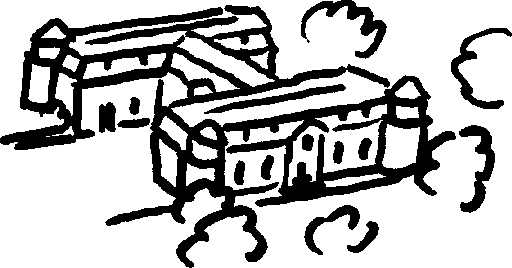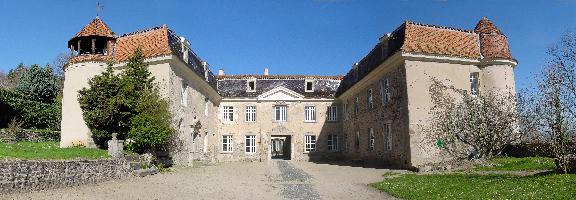Goutelas 2007 spring school

Low Frequency Radioastronomy :
Instrumentation, Science, Projects
Castle of Goutelas, Marcoux (Loire)
4 to 8 june 2007
CNRS School
Organised by the Paris Observatory
and the French Astronomy and Astrophysics Society (SF2A).
Organization
Presentation
Program and Speakers
Participants
Venue
Access and practical information
Registration
Key Words : Physics, Astrophysics, Radioastronomy
Public : Researchers, post-doctoral students, graduate students or engineers involved in the future ground-based low frequency radio projects and associated scientific fields, wishing to acquire or update their knowledge of the instrumentation and of the corresponding scientific topics. No previous experience in radioastronomy is required. Bases will be presented.
Scientific organizers : Philippe ZARKA (LESIA) and Michel TAGGER (APC)
Address: Observatoire de Paris
Place Jules Janssen
92195 Meudon
Tel.: 01 45 07 76 63
Fax.: 01 45 07 28 06
E mail: philippe.zarka at obspm.fr
SOC :
- Pascal Lautridou, SUBATECH, Ecole des Mines de Nantes – Université de Nantes – CNRS/IN2P3
- Michel Tagger, Ingénieur CEA, UMR 7164, APC
- Steve Torchinsky, SKA-DS Project Scientist, USN, Observatoire de Paris
- Philippe Zarka, Directeur de recherche, LESIA, UMR CNRS 8109, Observatoire de Paris
LOC :
- Michel Tagger, Ingénieur CEA, APC
- Philippe Zarka, Directeur de recherche, LESIA, UMR CNRS 8109, Observatoire de Paris
- Daniel Egret, astronome, UMS 2201, Observatoire de Paris
- Michèle Dreyfus, UMS 2201, Observatoire de Paris
THEME: Low frequency Radioastronomy : Instrumentation, Science, Projects

Castle of Goutelas. Photo: Emmanuel Bertin (2001)
This is the 30st Goutelas spring school.
Low frequency radioastronomy corresponds to the domain where coherent detection (amplitude and phase) is possible. t includes direct detection (below about 100 MHz) and heterodyne detection (up to a few GHz), followed by spatial or temporal analysis.
This frequency range quickly develops with the projects SKA (Square Kilometer Array, meter to centimeter range), LOFAR (LOw Frequency ARray, meter to decameter SKA precursor with on-the-moon perspectives), FASR (Fast Agile Solar Radioheliograph), CODALEMA (radio detection of high energy cosmic rays and perspectives in "pulse radioastronomy"). In France, experience comes from the Nançay instruments (Decimeter Radiotelescope, Decameter Array, Radioheliograph) as well as collaborations using the UTR-2 array in Kharkov, the VLA (Very Large Array) in New Mexico, the GMRT (Giant Meterwave Radio Telescope) in India, etc. Low frequency space radioastronomy is also a dynamical domain with many specificities.
Scientific themes will include:
- non thermal phenomena in (magnetized) plasmas through broadband dynamic spectrography (solar, planetary, exoplanetary, pulsar physics...) and imagery (Sun, SNR, galactic/intergalactic magnetic fields, jets...) ;
- atomic and molecular physics (lines and hyperfine transitions) related to cosmology, formation of structures, galaxies, Galaxy, comets ... ;
- particle physics (radio detection of high energy cosmic rays) ;
- etc.
The low frequency radio domain also raises specific instrumental problems, hardware (interferometers made of thousands of antennas, high speed digitization) and software (signal processing for RFI mitigation, polarization measurements, data volumes...).
While instruments and scientific context evolve rapidly, building/maintaining the expertise of researchers and students in this domain is a condition for the optimal exploitation of future instruments.
Public : Researchers, post-doctoral students, graduate students or engineers involved in the future ground-based low frequency radio projects and associated scientific fields, wishing to acquire or update their knowledge of the instrumentation and of the corresponding scientific topics. No previous experience in radioastronomy is required for researches and students is astrophysics and particle physics. Bases will be presented.
25 to 50 participants expected.
PROGRAM (definitive version)
• Basics in low frequency radioastronomy and coherent detection
• Low frequency antennas
• Interferometry, VLBI
• Modern, "intelligents" receivers
• Imagery, spectral, temporal and pulse measurements
• Electromagnetic environment, signal processing, RFI mitigation
• Ionospheric, interplanetary and interstellar radio propagation
• Large projets : SKA, LOFAR, FASR, CODALEMA, etc.
• Space-based low frequency radioastronomy
• Galaxies, cosmology, reionization and LF radioastronomy
• Stellar, planetary and plasma physics and LF radioastronomy
• Particle physics and LF radioastronomy
• Solar physics and LF radioastronomy